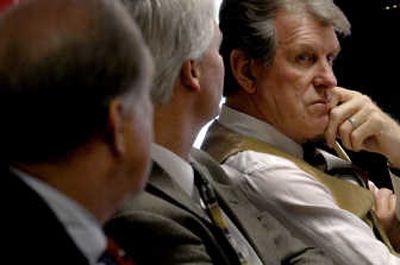Small Wallace turnout for governor

WALLACE – Shoshone County wasn’t too captivated by Gov. Butch Otter’s visit Tuesday, with only a mother and her home-schooled son showing up for the “Capitol for a Day” session.
But that didn’t mean Kingston resident Dawn Hauff and her 10-year-old son Dan were alone with the governor in the Wallace Senior Drop-in Center. About 40 people crammed into the room, but they didn’t exactly count as “average citizens.” All were elected or held some type of government job.
“I’ve never seen so many suits in Wallace in my life,” Mayor Ron Garitone said while welcoming Otter and several directors of state agencies, including Environmental Quality and Housing and Finance. “Someone drove by a little while ago and asked who died.”
Otter set up office in Wallace and opened the door to any resident with a question, concern or compliment.
His offer was met with silence and nervous glances around the room, which was decorated with paper Thanksgiving turkeys and fake leaves. Otter chuckled and said, “Maybe we are just going to talk to one another today.”
Panhandle Health District Director Jeanne Bock broke the silence by announcing that for the first time ever nearby residents in Burke Canyon no longer flush their sewage into Canyon Creek. After years of work and securing grant money, the health district and DEQ last week brought septic service to the tiny old mining town in a steep-sided canyon north of Wallace.
Garitone then turned the discussion to the controversial issue of water rights in North Idaho. Last month the Shoshone County commissioners attempted to slow or derail the adjudication of water rights by drafting a resolution against sorting out who owns how much water in North Idaho. Shoshone, Bonner, Boundary and Benewah county commissioners signed the anti-adjudication proposal, while commissioners in Kootenai and Latah counties declined.
Garitone said the “average” person like himself has difficulty understanding the process, and he questioned whether it will cost people – especially those on city water systems – money, and whether they will have to hire attorneys.
“I suggest some method of communication to get it down to a more earthly manner,” he said. “We are kind of confused.”
David Tuthill, director of the Department of Water Resources, said the court process of adjudication was to begin in September but is now on hold because of mixed sentiments in North Idaho.
The department recently wrote the Idaho Legislature and asked for direction on how to proceed.
Tuthill clarified for the mayor that the water rights sorting won’t cost people on municipal water any money and that individuals won’t need a lawyer. Yet people with private wells will have to pay a $100 filing fee to have their water rights reviewed, he said.
The Legislature approved the adjudication of North Idaho water rights in its 2006 session, with 12 North Idaho lawmakers sponsoring the bill and overwhelming support in both houses. Otter signed the measure into law.
Dan Hauff yawned and stared off as the people in suits talked. “It probably won’t be interesting to me for another 16 years,” the fourth-grader said.
The Hauffs came to meet the governor after taking a road trip to Boise and other Idaho historical spots last week as part of the boy’s schooling. While in the capital, Hauff got a tour of Otter’s office and his mother took a photo of him sitting in the governor’s big, stuffed leather chair.
To Hauff, that was more exciting than actually meeting the governor. And the Wallace senior center didn’t have any leather chairs, just a blue couch where he lounged.
His mother took the opportunity to tell the governor how difficult it was for her family – her husband is a truck driver – to survive with high gas costs, truck hauling taxes and health insurance. She fears any gas tax increase or even registration fee increases that would help put money into road repair coffers.
She also wanted to hear how Otter plans to help with ever-increasing health care costs. “There’s not a lot of money left,” Dawn Hauff said.
Otter has held 11 similar “Capitol for a Day” sessions across the state since his 2006 election. The first was in January in Bonners Ferry.
Since few people attended, Garitone suggested the governor walk down the street and check out the “probabilistic” center of the universe – a sewer access cover that declares Wallace the official center of the universe. No one can prove it is or isn’t the center, Garitone explained in a 2004 dedication ceremony of the curious city landmark.
Otter played off the invite as he explained the need for the traveling meetings.
“It gives us an opportunity to get out of somewhere some of these folks thought was the center of the universe,” Otter said.